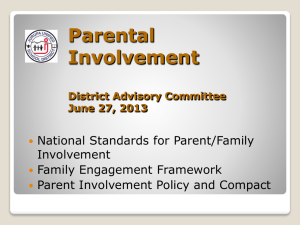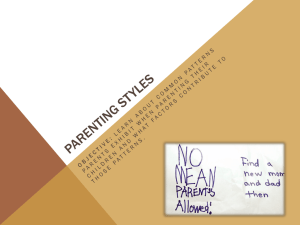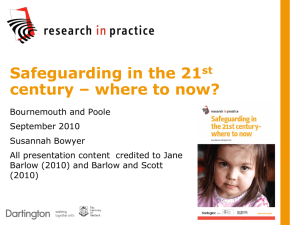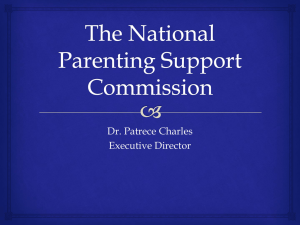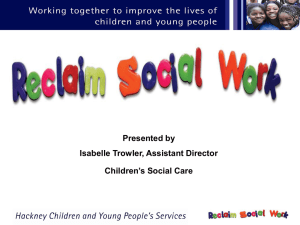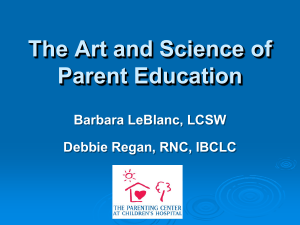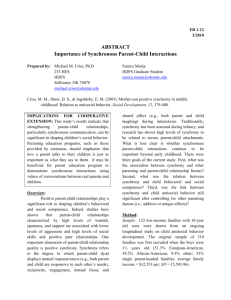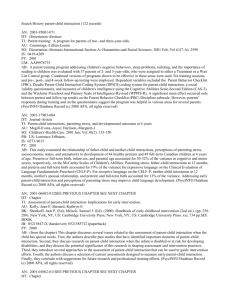Improving Parent-Child Relations Telecourse
advertisement
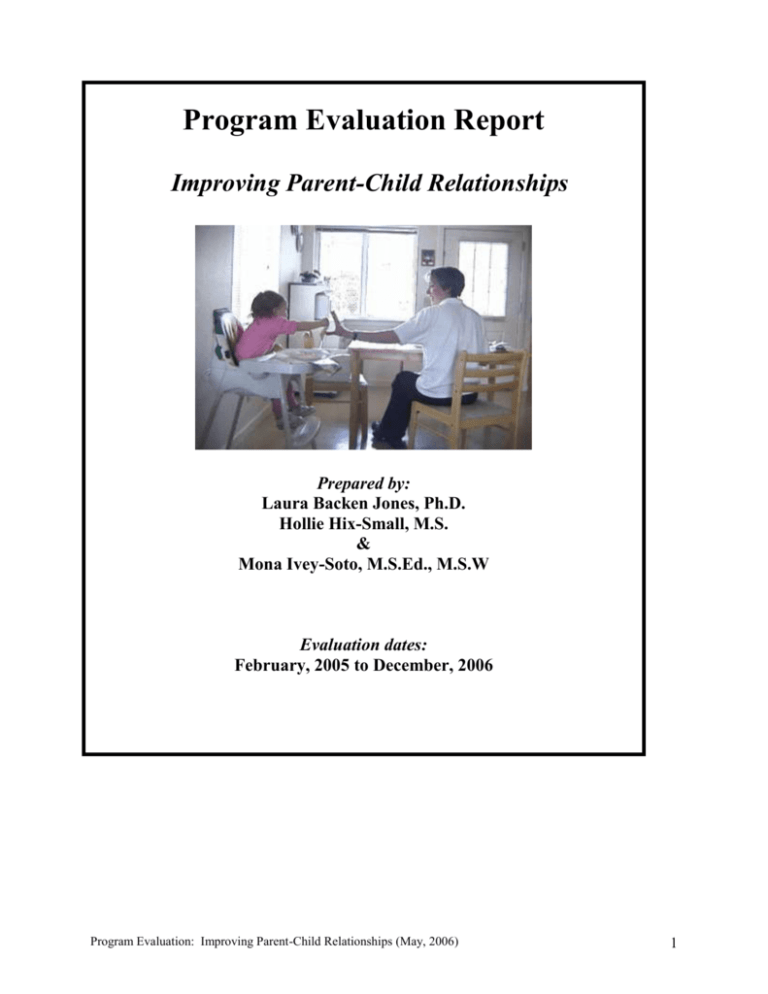
Program Evaluation Report Improving Parent-Child Relationships Prepared by: Laura Backen Jones, Ph.D. Hollie Hix-Small, M.S. & Mona Ivey-Soto, M.S.Ed., M.S.W Evaluation dates: February, 2005 to December, 2006 Program Evaluation: Improving Parent-Child Relationships (May, 2006) 1 Executive Summary Mission and Purpose Improving Parent-Child Relationships (IPCR), a self-instructional parenting program, was created to provide parents with practical information to help them improve their relationships and maintain healthy bonds with their children. The program shows “real life” parenting scenarios, which highlight key themes such as the influence of parental expectations, building mutual respect, communication and effective limit-setting. The program helps parents adopt a positive approach to discipline, organize family life, establish parental credibility without punishment or coercion, build relationships with their children, and increase family cooperation and contribution. The self-instructional nature of the program gives parents the opportunity to receive their training on their own, at a time that is convenient for them. Program Description Improving Parent-Child Relationships consists of twenty, 30-minute videotape episodes along with a supplemental Viewer’s Guide, which features real parents and children interacting and encountering day-to-day “real life” situations. The course was designed to teach participants about parenting and child development, including behavioral issues in children and the relationships between the parent and child. Improving Parent-Child Relationships seeks to positively impact the parent-child relationship through parent knowledge enhancement of the parent-child dynamic in order to promote healthy bonds between the parent and child. The videos follow a uniform format of presenting an introduction to the episode topic, followed by parentchild interaction video footage highlighting the targeted concept. A licensed psychologist who initially presented the introduction of the targeted concept then leads the parent in the video footage through a reflective, individual counseling session. The program covers a wide range of parenting topics which together focus on children between the toddler and middle-school-age range. The Improving Parent-Child Relationships telecourse videotaped situations focus on establishing creditability as a parent, improving communication, setting reasonable and consistent limits, stimulating independence and responsibility, and improving order, structure, and routine. Approaches to typical problems are illustrated (e.g. fighting, crying, whining, conflict among siblings, bedtime) and discussed so as to create an opportunity to reflect on the presented situation and principles. Formal Evaluation Goals and Outcomes This program evaluation investigated the efficacy of IPCR with a convenience sample of 73 parent (N= 58) and non-parent child caregivers (N= 15) attending a local community college. The overall evaluation questions focused on the following general Program Evaluation: Improving Parent-Child Relationships (May, 2006) 2 questions: (1) Does the program improve parent knowledge about, and satisfaction with, their adult-child relationship? Do parents/caregivers change their actions (e.g. discipline) and their sense of efficacy in parenting after participating in the program? (3) Does parental/ caregiver perception of their relationship with children, and their satisfaction with children’s behavior, improve after taking the course? The evaluation utilized a summative, mixed-method, quasi-experimental retrospective approach. Evaluation time constraints necessitated a single data collection session making the retrospective design an ideal choice. The retrospective approach has successfully captured pre-post change in similar designs. Research has shown the difference between the retrospective pretest and the posttest correlate more strongly with objective indicators of change than does the difference between the conventional pretest and the posttest (Hoogsraten, 1982). A convenience sample was obtained for this evaluation. Results Consumer Satisfaction Survey: The Consumer Satisfaction Survey was created to assess program content including its ability to keep the participants’ attention, its realism, usefulness, impact on the participants’ parenting, etc. Both qualitative and quantitative data were collected with this instrument. The majority of the questions were measured on a four-point scale ranging from 1 “Not at all” to 4 “Very Much.” 99% percent of the respondents said that the information presented in the videos was “quite a bit” or “very” useful. 97% of caregivers endorsed “very much” or “quite a bit” to: Did the series help you see that other parents have similar challenges as you do? 93% of respondents said that the series helped them understand how to improve their relationships with children. While only 51% of caregivers surveyed said that information in the videos was new to them, 74% said that the series changed their ideas about disciplining children and 96% said that they would change their parenting practices after participating in the series. Overwhelming, the respondents commented that they would now take firm action in times of conflict, rather than overtalking without following through. Other caregivers commented on how they will work more to manage their own behavior during conflict, establish routines, be more consistent, give help on a task rather than take over, give children opportunities to develop skills independently, and not feel guilty about doing “what [they] know is right for their children.” The Parenting Self-Efficacy Scale, previously adapted by Metzler and Jones from the original Parenting Ladder by Katzev (2000) and Pratt et al. (2000), was slightly modified for the current evaluation. Previous use of the scale by Metzler and Jones with similar Program Evaluation: Improving Parent-Child Relationships (May, 2006) 3 populations proved valid and reliable. The Parent Self-Efficacy Scale consisted of fourteen questions. Seven questions asked the respondent about their parenting knowledge before watching the parenting series and seven mirroring evaluated their knowledge after watching approximately half of the program episodes. The response scale ranged from 0 “Low” to 6 “High.” Participants were asked to think about their parenting or work with children as a ladder that can be climbed from the lowest, or least competent rung, to the highest, most experienced rung. A ladder graphic was placed next to the set of questions. Two-tailed t-tests were conducted on pre-to-post scores on each of the ladder variables. Results are summarized in Table 1. Table 1. Parenting Self-Efficacy Scores Mean Difference Knowledge and efficacy items Knowledge improve your relationship with children? Confidence know what is right for children? Confidence handle the challenges in working with children? Your confidence in your ability to discipline children Child items The child’s cooperation with your requests? Your satisfaction with the child’s general behavior? Your satisfaction with your relationship with this child? 1.44 1.08 1.17 1.27 SD 1.3 1.2 1.09 1.2 t 9.04* 7.3* 9.0* 8.8* 0.97 1.04 0.94 1.16 1.06 1.06 7.0* 8.1* 7.4* Score *p<.001 Caregivers’ sense of efficacy increased significantly in all areas assessed from pre-to-post program, including a sense of efficacy and satisfaction in their own ideas, behavior and abilities, and in their satisfaction with their children’s cooperation and general behavior, and in their satisfaction in their relationship with their child. Conclusions The Improving Parent Child Relationships series was developed to offer an alternative way for parents to receive parenting education. With increasingly large numbers of parents working full-time outside of the home and societal changes, parents are finding it more and more difficult to access parenting education. The goal of the Improving Parent Child Relationships series was to provide an accessible parenting education program to help parents and caregivers improve relationships with children in their care, leading to increased satisfaction in the relationship and in children’s behavior and an increased sense of efficacy in the tasks of parenting. After viewing 20 thirty-minute videotapes and reading the Viewer’s Guide over a period of ten weeks, caregivers improved significantly in their sense of efficacy in working with children and in their satisfaction in their relationships with children. This is an initial feasibility study. Future research will be conducted using a wait-list randomized-controlled design with a larger sample of parents. Program Evaluation: Improving Parent-Child Relationships (May, 2006) 4
